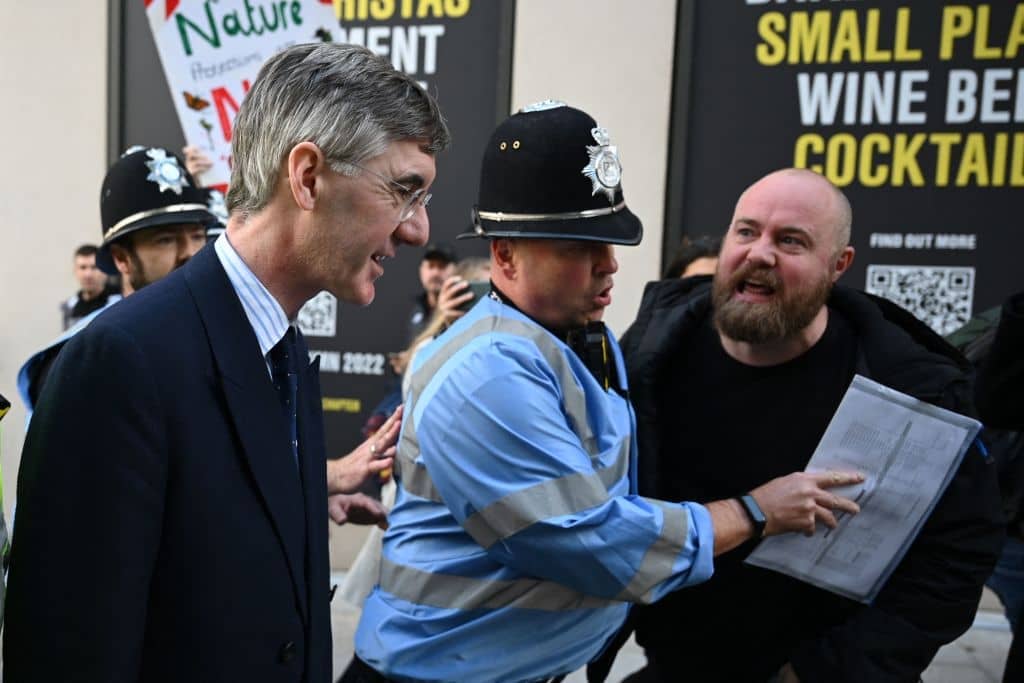Events in Birmingham this week reveal a crisis in the policing of public protest. It was no surprise that protestors would make their views loudly known outside the Conservative party conference. In exercising their rights to assemble and to speak, protestors play an important role in a democracy. But some of those attending the conference, exercising their rights to assemble and to speak, were, at times, subject to verbal and physical abuse and intimidation. They have also been exposed to levels of noise that, in certain parts of the conference centre, made it difficult for speakers to make themselves heard. The police have been curiously reluctant to act to protect attendees from abuse and intimidation, or from being silenced.
The police seem terribly confused. So why did West Midlands Police fail to act? In relation to disruptive levels of noise, some officers at first claimed that the Human Rights Act 1998 meant they had to allow the protestors to make themselves heard. The Act seems to have become a catch-all excuse for police inaction in relation to protest. While the Act does cause difficulties for the police, as for many other public services, it does not confer an absolute right to protest. Rights to assemble and to speak, which one exercises in protesting, are qualified rights and can be limited in order to protect the rights of others, including the rights of those attending a party conference. The law does not mean that anyone with a megaphone can exercise a heckler’s veto.
Some senior police officers also appear wary that any firm attempt to limit protest – acting in response to verbal and physical abuse, intimidation and excess noise – might be seen as evidence of incipient authoritarianism. The West Midlands police commander on the ground in Birmingham reportedly told the Tories that it would be ‘too political’ for his officers to intervene. ‘This isn’t Belarus,’ he is said to have added.
The police seem terribly confused
Party bosses were also told that the noise from protesters only reached an ‘unsatisfactory level’ for a short period of time, which is why they had not intervened more robustly.
But the police should not fail to act to protect people, including those active in politics, from abuse, intimidation and unreasonable disruption in order to avoid controversy. The choice for police is not whether to do nothing or to arrest (or baton) the crowd. Enforcing reasonable limits on public protest, preventing abuse and excess noise is not authoritarian repression. Police officers should not shirk their duty by pretending it is.
The disruption in Birmingham is not an isolated incident. Conference season aside, Westminster and Whitehall are often hamstrung by protest, sometimes making it difficult for parliamentarians to enter or exit Parliament without being subject to abuse or intimidation.
During the Brexit controversies, MPs from both sides were routinely harassed around the Palace of Westminster, sometimes with a view to intimidating them to make them change their positions. The police were slow to act, leading to a public rebuke by the-then speaker,. Eventually, special legislation governing protest in the area surrounding Parliament was introduced. More recently, a protester left bottles of urine outside the Equality and Human Rights Commission; members of Extinction Rebellion and Insulate Britain repeatedly obstruct roads, refineries and fuel stations (and printing presses); others glue themselves to art works.
This rising tide of disruptive and disorderly protest poses a serious challenge for police. Yet it is worrying that senior police officers remain ignorant about their powers under the Police, Crime, Sentencing and Courts Act 2022, which gives officers the authority to impose maximum noise level limits and start and finish times to demonstrations.
The freedom to protest is fundamental in a free society, but it is subject to reasonable limits. Engaging in a protest does not mean the criminal law no longer applies to you. Only last week, the Court of Appeal rejected the idea, which had been advanced at the Colston trial, that what would otherwise be instances of criminal damage (or even assault) could be excused as exercises of a right to protest. That idea originated in the Supreme Court’s Ziegler judgment in 2021, which made it difficult for police to know when it was lawful to arrest protestors for obstructing a highway. While the Court of Appeal’s Colston judgment is welcome, it is only a partial fix. The Ziegler judgment will have to be overturned by the Supreme Court or reversed by Parliament for legal certainty to be restored.
There are problems in the law that governs public protest which Parliament should correct. But there is also a wider problem with police officers misunderstanding the existing law and their responsibilities and all too ready to seize on any excuse for inaction. The government should urgently review the legal guidance that is issued to police in relation to public protest.
Richard Ekins is Head of Policy Exchange’s Judicial Power Project and Professor of Law and Constitutional Government, University of Oxford






Comments